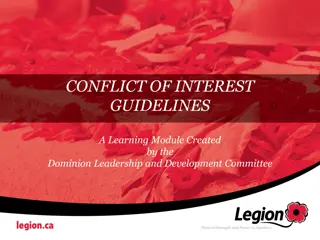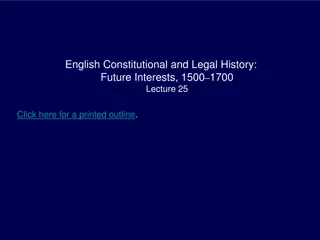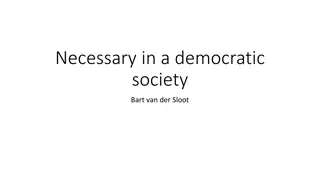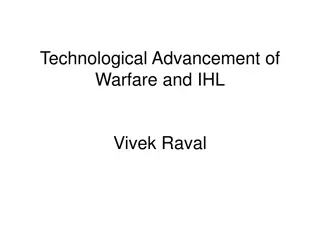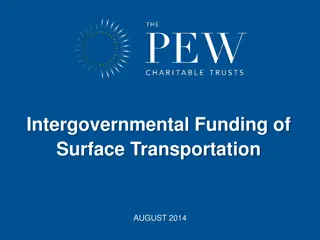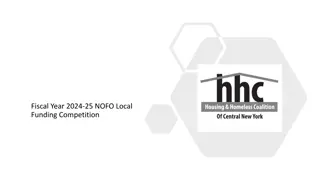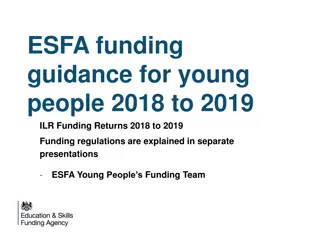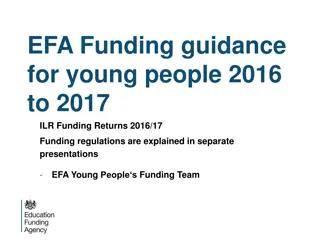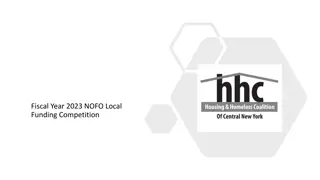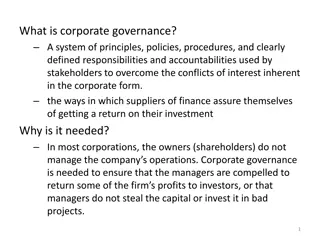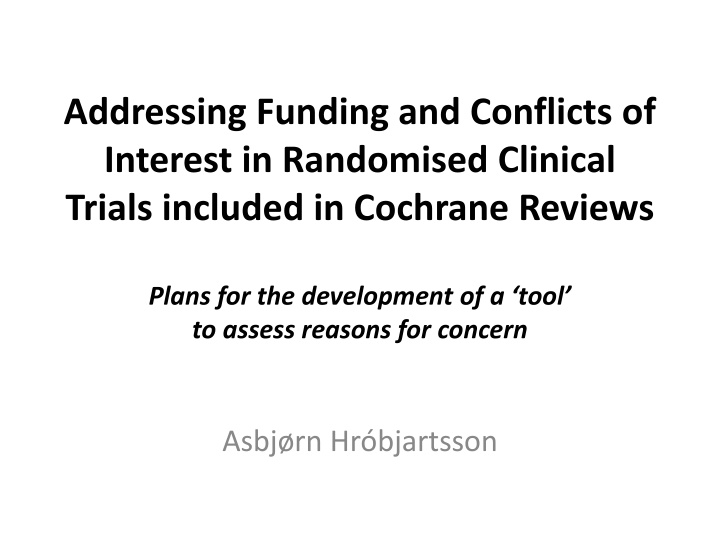
Funding and Conflicts of Interest in Clinical Trials
Explore the complex issues surrounding funding and conflicts of interest in randomized clinical trials included in Cochrane Reviews. Debates, challenges, and potential approaches are discussed, highlighting the impact on bias and quality of evidence.
Download Presentation

Please find below an Image/Link to download the presentation.
The content on the website is provided AS IS for your information and personal use only. It may not be sold, licensed, or shared on other websites without obtaining consent from the author. If you encounter any issues during the download, it is possible that the publisher has removed the file from their server.
You are allowed to download the files provided on this website for personal or commercial use, subject to the condition that they are used lawfully. All files are the property of their respective owners.
The content on the website is provided AS IS for your information and personal use only. It may not be sold, licensed, or shared on other websites without obtaining consent from the author.
E N D
Presentation Transcript
Addressing Funding and Conflicts of Interest in Randomised Clinical Trials included in Cochrane Reviews Plans for the development of a tool to assess reasons for concern Asbj rn Hr bjartsson
Disposition Background Status Challenges Suggested approach
Jonathan Sterne vs. Lisa Bero debate The Cochrane risk of bias tool should not include funding source as a standard item (Cochrane Library 2013): In summary, conflict of interest in reporting of medical research is a substantial and unresolved problem. There are particular problems associated with pharmaceutical industry-funded research, but these should be dealt with by: (1) reporting and commenting on conflicts of interest as a standard component of Cochrane systematic reviews; (2) better procedures and an improved tool to assess reporting biases; and (3) more extensive use of mixed treatment comparisons.
Jonathan Sterne vs. Lisa Bero debate The Cochrane risk of bias tool should include funding source as a standard item because (Cochrane Library 2013): 1. Funding source fits the definition of bias 2. There is empirically-based evidence of bias related to funding source 3. The observed bias related to funding source cannot be captured by the risk of bias criteria currently assessed with the risk of bias tool .
Broad consensus Funding and Conflicts of interest may impact on risk of bias Funding and conflicts of interest may impact on quality of the evidence Funding and conflict of interest may be a basis for sensitivity analysis
Risk of bias tool Six bias domains Generation of allocation sequence Concealment of allocation sequence Blinding of patient and care provider Blinding of outcome assessor Incomplete outcome data Selective reporting Domains are mechanistically defined Risk of bias tool builds on the idea of core biases Funding and conflict of interest is not regarded a core bias
Funding and CoI Association between industry funding and trial conclusion (Lundh CDSR 2012) Few direct comparisons Strong incentives for positive trial results Trial 329 (Le Noury BMJ 2015) One failed stage III trial on idalopirdine for Alzheimer dropped the prize of Lundbeck s stock by 15% (Bloomberg 2016) Examples of selective reporting of industry initiated trials and outcomes SSRI for adolescents and children (Whittington Lancet 2004)
Status in Cochrane reviews Cochrane Handbook: Funding and conflict of interest should not be addressed as a risk of bias domain. The Handbook provides no clear approach as to how funding and conflicts of interests should be addressed. 32% of Cochrane reviews published in 2014 incorporated funding into the other bias function (5% added funding as a separate domain). J rgensen et al. Syst Rev. 2016 May 10;5:80.
Status risk of bias tool Risk of bias tool 2.0 Several changes The other domain option gone No domain for funding Plans for tool to address funding and conflicts of interest Plans underway to develop a specific tool for reporting bias
Why is a tool important? Considerable discrepancy between the Cochrane risk of bias tool approach vs. actual praxis Concern of the risk that assessment of funding and conflict of interest is conducted inconsistently and crudely Concern of the risk that assessment of funding and conflict of interest is not conducted, and thus does not impact on risk of bias assessments and on assessment of the quality of evidence
The aim of the tool 1) To systematically identify and summarise relevant information on funding and conflicts of interests 2) To coherently assesses reasons for concern for funding and conflicts of interests (assesses whether or not funding and conflict of interest may impact importantly on trial results and quality of evidence) 3) To incorporate a user-friendly interface between assessments of concern and: a) risk of bias, b) quality of evidence (e.g. risk of publication bias and indirectness) 4) To provide background for sensitivity/subgroup analyses
Framework Core group Isabelle Boutron, Lesley Stewart, Ian Shrier, Andreas Lundh, Asbj rn Hr bjartsson Wider group Lisa Bero, Peter G tzsche, Tom Jefferson, Kay Dickersin, Julian Higgins, Jonathan Sterne, Brett Thombs and An-Wen Chan. Set-up and time line Andreas Lund will work on the project on a day to day basis. We hope to have a tool ready for pilot testing in 6 months.
Summary Funding and conflict of interest are core aspects of a randomised trial The present approach suggested for Cochrane Reviews is incomplete and challenging We propose developing a tool which systematically addresses funding and conflict of interest



